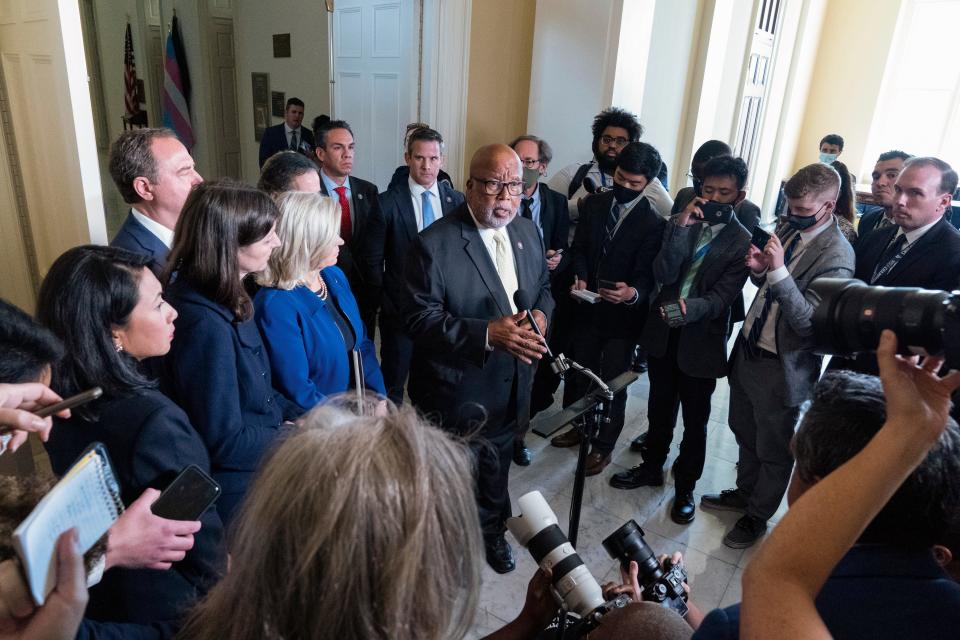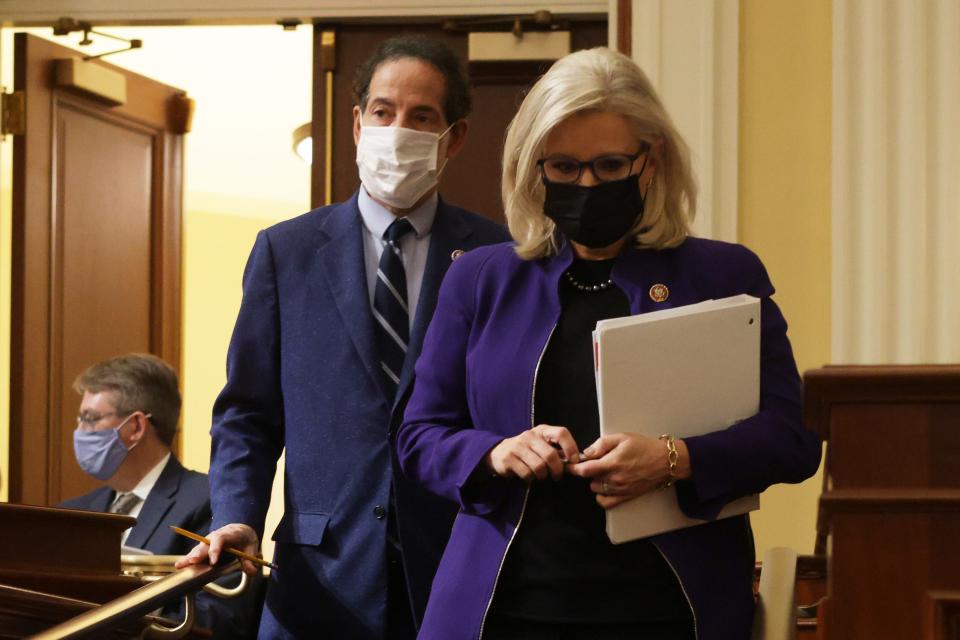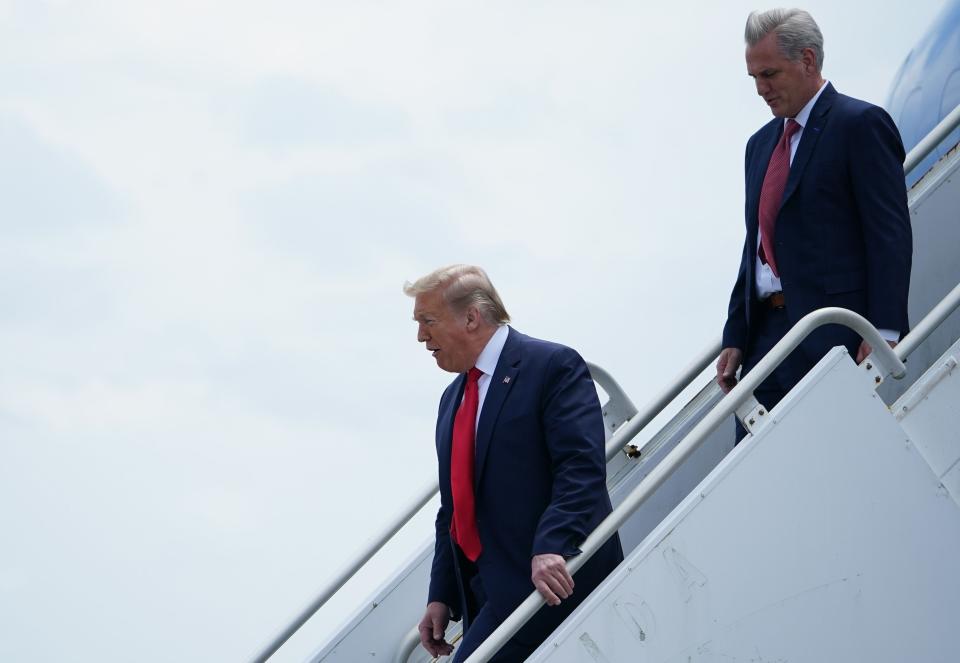Jan. 6 committee aims for June hearings on Capitol attack. Will they affect the 2022 elections?
- Oops!Something went wrong.Please try again later.
- Oops!Something went wrong.Please try again later.
WASHINGTON – The House committee investigating the Capitol attack expects to hold hearings in June and produce a report of its findings by fall, a schedule that will throw the findings into the political battles of party primaries and the general election determining control of Congress.
Members of the committee have acknowledged the urgency of their investigation into what led to the attack Jan. 6, 2021, what happened that day and how to prevent it from occurring again. But legal battles, including one from former President Donald Trump that went all the way to the Supreme Court, have delayed the committee’s work as new lines of inquiry emerged.
Holding weeks of hearings in the heart of the primaries could highlight partisan reaction to the results. But experts say the findings of a panel led by Democrats into Trump and his Republican supporters would be political whenever they are released.
“It’s always politics season,” said Peter Loge, a media professor at George Washington University and former chief of staff for a Democratic member of Congress.
Related video: Supreme Court allows release of Trump's files to Jan. 6 panel
Young voters: Young voters disenchanted with politics, but on pace to match 2018 midterms turnout - poll
The political impact the hearings will have is unclear. Democrats will focus a spotlight on Trump and the attack on Congress to prevent the peaceful transfer of power to President Joe Biden. But Republicans have argued Democrats should focus instead on priorities such as high inflation or immigration.
“How this plays out in the primaries is really hard to say because this news can break both ways,” said Patrick Egan, associate professor of politics and public policy at New York University.
The 2022 midterm election will determine who controls Congress for the second half of President Joe Biden's term. The Senate is now tied with 50 members caucusing with each party and Democrats holding the tie-breaker in Vice President Kamala Harris. In the House, a swing in a half-dozen seats could tip control from Democrats to Republicans.
Party primaries in the coming months will set the stage for the Nov. 8 general election. The committee's revelations could play pivotal roles in races where Trump endorsed candidates who continue to challenge the 2020 election. In heavily Republican districts, GOP primaries could determine the eventual winners.

Immigration: Supreme Court wrestles with 'remain in Mexico' policy as immigration erupts as midterm issue
In Wyoming, Trump endorsed Harriet Hageman to challenge one of the committee members, Rep. Liz Cheney, in the Aug. 16 primary. Cheney was one of 10 House Republicans who voted to impeach Trump in 2021 for inciting the Capitol attack.
In Alaska, Trump endorsed Kelly Tshibaka to challenge Sen. Lisa Murkowski in the Aug. 16 primary. Murkowski was one of seven Senate Republicans who voted to convict Trump of impeachment, although he was acquitted.
Gauging how the hearings could affect the races is difficult in the polarized political climate. Democratic and Republican voters could react differently to the findings. And Republicans could be divided over the hearings, as Trump endorses opponents to Republican lawmakers who voted to impeach and convict him for inciting the Jan. 6 attack, experts said.
“It’s possible these kinds of revelations have some impact on a few primaries that are out there,” Egan said. “But it’s really hard to say what direction that impact would be.”
Kurt Braddock, an assistant professor of public communication at American University, said Trump supporters tend to explain away findings and investigations that present the former president in a negative light.
“Individuals who are kind of the die-hard Trump supporters, they almost see him as a reduction sauce of what they want to support and they don’t see that same level in those that he endorses,” Braddock said.
Ohio Senate race: What to know about JD Vance, venture capitalist running for office
Committee hearings kept getting pushed back
The committee held its first hearing in July 2021 with four police officers who defended the Capitol against a mob of Trump supporters who injured 140 officers, ransacked the building and temporarily halted Congress counting Electoral College votes.
The chairman, Rep. Bennie Thompson, D-Miss., aimed for hearings about the panel’s findings early this year. Weeks of hearings are planned, including charting what happened minute by minute at the Capitol and at the White House.
But as the committee gathered more testimony and thousands of pages of documents, the timing for hearings slipped to March, April and now June. Thompson told reporters Monday “progress is coming at a better pace” and a final report is expected in the fall.
"I do believe that we are going to tell this story of perhaps the greatest political crime or attempted political crime in American history," said Rep. Jamie Raskin, D-Md., a committee member. "We have voluminous detail that is helping us put the whole story together."

May primaries: String of May Republican primaries to test Trump's staying power in the GOP
Party primaries heat up during June
Sixteen states hold primaries in June. Another 23 have contests in July, August and September. The committee's investigation could make an impression across numerous races in those states.
Braddock cautioned there are not a lot of Republicans left on the fence about issues related to the insurrection.
“I think at this point the Trump supporters are the Trump supporters and the anti-Trump people are the anti-Trump people, and I don’t think there’s much wiggle room with regard to where people lean," he said.
Trump impeachment: The 10 Republicans who voted to impeach Donald Trump: 'There has never been a greater betrayal by a president'
In the South Carolina primary June 28, Trump endorsed challengers against GOP Reps. Tom Rice and Nancy Mace. Trump endorsed state Rep. Russell Fry against Rice, who voted to impeach the former president. Trump endorsed Katie Arrington against Mace, who voted to cite Trump aide Steve Bannon for contempt for defying the committee's subpoena.
In the Washington state primary Aug. 2, Trump endorsed challengers to GOP Reps. Dan Newhouse and Jamie Herrera Beutler, who each voted to impeach him. Likewise, in the Michigan primary Aug. 2, Trump endorsed John Gibbs against Rep. Peter Meijer, who also voted to impeach Trump.
The committee's investigation could also potentially play a role in competitive Senate races, where choices in the Republican primaries will also have an impact in the general elections against Democrats.
In an open race for Senate in Ohio, Trump endorsed J.D. Vance in the Tuesday primary that includes candidate Josh Mandel. And for an open Senate seat in Pennsylvania, Trump endorsed Mehmet Oz in the May 17 primary against fellow Republican Dave McCormick, who was supported by Trump aides.
“Somebody’s not going to vote for J.D. Vance as fast as they’re going to vote for Donald Trump if they’re a Trump supporter,” Braddock said. “It doesn’t hurt them, but I don’t think they’re going to get the same kind of passionate enthusiasm that Trump himself would get.”
Progressives: Exclusive: Rep. Pramila Jayapal issues midterm endorsements in effort to boost progressives
Nicholas Valentino, a professor of political science at the University of Michigan, said most voters who do vote in the midterms don't tend to pay attention until very close to the elections.
"Given that that’s the salient cycle of politics, that timing would make more sense because the committee would want its work to have its greatest impact," Valentino said.

Trump, supporters slow inquiry with legal challenges
The committee has interviewed more than 800 witnesses, including more than a dozen Trump White House staffers, since it was created in July 2021.
But the work has been slowed by negotiations with defiant witnesses and litigation. More than 20 lawsuits have challenged the panel's subpoenas for testimony and documents.
After a federal appeals court ruled that Biden’s waiver of executive privilege outweighed Trump’s demand that administration documents remain confidential, the Supreme Court refused to hear the case.
The House held Trump political adviser Steve Bannon, former White House chief of staff Mark Meadows, former trade adviser Peter Navarro and former deputy chief of staff Dan Scavino in contempt for defying subpoenas.
The Justice Department is prosecuting Bannon, with a trial set for July 18, and hasn’t decided on whether to charge the others.
Most of the civil lawsuits against the committee are pending. But a federal judge last month ordered the release of emails from John Eastman, one of Trump’s private lawyers.
More: The Jan. 6 committee got a boost from a ruling on a confidential memo. What's next?
The committee hasn’t decided whether to subpoena Trump or former Vice President Mike Pence. The panel has invited House Minority Leader Kevin McCarthy, R-Calif., and Reps. Jim Jordan, R-Ohio, and Scott Perry, R-Pa., but each declined.
McCarthy and Jordan spoke with Trump on Jan. 6 and the committee has evidence Perry supported the appointment of an acting attorney general to investigate false claims of voter fraud.
“The committee wants to give every opportunity to people to come forward with information relevant to the investigation,” Raskin said. “We feel that’s true regardless of your political party or title or job. We want everybody to come in. What that means in a particular case remains to be seen.”

Leaks reveal details about Jan. 6, but not whole picture
While the committee plugs along, leaks of its findings revealed details such as text messages Meadows provided the committee before he stopped cooperating.
The New York Times reported Tuesday that McCarthy feared some Republican lawmakers put “people in jeopardy” on Jan. 6.
“In all probability, he will be issued another invitation to come, just like some other members,” Thompson said.
Political experts and lawmakers said hearings could provide a comprehensive narrative about what happened, instead of spurts of flashy details that have been leaked over the past several months.
“I find it incredibly frustrating and troubling that the coverage is now basically elected officials and some in the media shouting, ‘squirrel,’” Loge said. “They’ve got a bunch of people, partisans, releasing squirrels in the park and then running around shouting, ‘Squirrel! Squirrel! Squirrel!’”
Raskin said he didn’t think the committee was leaking the records, but that they kindled interest in the probe.
Rep. Kevin McCarthy: Lawmakers sound off on recorded call of Kevin McCarthy saying Trump should resign over Jan. 6
“They are definitely whetting the public’s appetite for the hearings because we are going to tell a far more systematic and coherent story than the narrow leaks that are getting out,” Raskin said. “The leaks obviously contain just a small proportion of information that is out.”
Experts say the committee's hearings and final report could provide a comprehensive explanation for what happened, to educate voters for their choices in the primaries and general election.
“There are big, big stories that are already out there that are going to distract from this Jan. 6 story," Egan said, such as Ukraine and inflation. "It’s really up to the committee to tell Americans of all political persuasions, all political parties, what happened, who was responsible and how we make sure this never happens again."
This article originally appeared on USA TODAY: Jan. 6 committee looking at June hearings. Will that affect elections?

